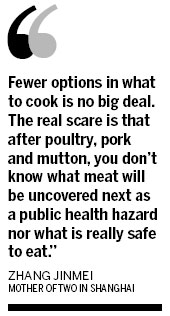Not much stomach for mutton
Updated: 2013-05-06 08:09
By Wang Zhenghua in Shanghai (China Daily)
|
||||||||

Following pork, chicken and duck, Zhang Jinmei has erased mutton from her family's menu because of reports that the lamb sold in the city's produce markets may turn out to be rat, fox or mink.
Over the weekend, the city's food safety commission office said it will investigate where the fake mutton has been sent after police broke up a criminal ring selling it from uninspected meat in Wuxi, Jiangsu province. The products are believed to have trickled down to markets in Shanghai.
Earlier, families in much of China removed poultry from their menu because of the spread of the potentially lethal H7N9 bird flu virus. Pork sales were also briefly hit after more than 10,000 pig carcasses were found floating down the main river through Shanghai in March.
"These are really hard times for a housewife," said Zhang, a mother of two. "Fewer options in what to cook is no big deal. The real scare is that after poultry, pork and mutton, you don't know what meat will be uncovered next as a public health hazard nor what is really safe to eat."
Lamb and mutton, a traditional ingredient in dishes such as hotpot on Chinese tables, is the most recent in a long list of food safety scares.
In the raid, involving more than 200 officers, police in Shanghai and Jiangsu province arrested 63 people from a gang that allegedly sold more than 10 million yuan ($1.6 million) worth of fake mutton over three years, the Ministry of Public Security said on Thursday.
The gang passed the meat off as mutton by adding gelatine, carmine, nitrate and other substances, the ministry said.
Because of concerns about the quality of mutton, many Shanghai families have stopped buying it and some vendors have stopped selling it.
"After the scandal, we stopped getting new supplies from a wholesale market in Baoshan district," a meat merchant at a market on Tianping Road in Shanghai said on Sunday.
"Mutton was less popular than pork or beef. Since the scandal, even fewer customers ask for it," added the vendor named Zhang.
Consumers can still find mutton products at big supermarkets, but only a limited cuts, such as mutton ribs and lamb rolls, are available.
"We can guarantee the source of our product," Wang Wenjing, a saleswoman at Century Lianhua supermarket, said on Sunday. "Mutton is less popular these days, not only because of the scandal, but also because it's the wrong season - mutton is more favored in the winter."
Some of Shanghai's produce markets and hotspot restaurants are involved in the scandal, local media outlets reported.
Dai Mei, a popular hotspot chain restaurant in Shanghai, which according to Jiefang Daily served fake mutton, denied on Sunday any wrongdoing.
"I can assure you, we never used even a gram of the product exposed in the news report, and our lamb is all certified," a company official named Xia told China Daily on Sunday. He also said his claim can be verified by the joint inspection launched by the city's health and industry and commerce authorities over the weekend.
The city's food safety watchdog did not release a news briefing about the inspection on Sunday. The industry and commerce administration has issued a circular to increase the frequency of the inspections.
wangzhenghua@chinadaily.com.cn
(China Daily 05/06/2013 page5)

 Michelle lays roses at site along Berlin Wall
Michelle lays roses at site along Berlin Wall
 Historic space lecture in Tiangong-1 commences
Historic space lecture in Tiangong-1 commences
 'Sopranos' Star James Gandolfini dead at 51
'Sopranos' Star James Gandolfini dead at 51
 UN: Number of refugees hits 18-year high
UN: Number of refugees hits 18-year high
 Slide: Jet exercises from aircraft carrier
Slide: Jet exercises from aircraft carrier
 Talks establish fishery hotline
Talks establish fishery hotline
 Foreign buyers eye Chinese drones
Foreign buyers eye Chinese drones
 UN chief hails China's peacekeepers
UN chief hails China's peacekeepers
Most Viewed
Editor's Picks

|

|

|

|

|

|
Today's Top News
Shenzhou X astronaut gives lecture today
US told to reassess duties on Chinese paper
Chinese seek greater share of satellite market
Russia rejects Obama's nuke cut proposal
US immigration bill sees Senate breakthrough
Brazilian cities revoke fare hikes
Moody's warns on China's local govt debt
Air quality in major cities drops in May
US Weekly

|

|







